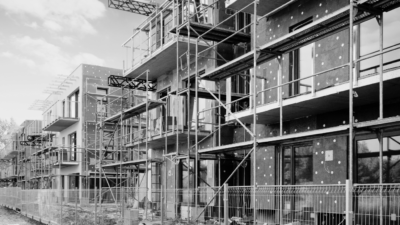Doubling down on previous promises to reform the housing market, Tuesday saw Shadow Chancellor Rachel Reeves announce Labour’s plan to build 1.5m new homes over the next five years – funded through stamp duty reforms – with the overarching goal being to make 70% of British households homeowners.
However, some experts have commented that increasing the stamp duty surcharge for foreign nationals could actually have disastrous consequences for the property market.
Holding to their “iron-clad” fiscal rules, Reeves also announced that the construction of these new homes will be primarily funded through reforms to stamp duty, increasing the rate for overseas buyers.
As things currently stand, overseas buyers pay a 2% surcharge on UK property, and a further 5% if said property will not be their main home.
These policies mark a shift towards a fiscally interventionist approach to the housing market within the party, further signified by Keir Starmer’s proposed tax on private developers to fund new social housing.
The news comes at a time when the UK housing market faces an overwhelming supply and demand imbalance, with the National Housing Federation estimating that at least 340,000 new homes must be built each year to meet the current demand.
However, Group Chairman of Cornerstone Tax, David Hannah, asserts that by raising the stamp duty surcharge for overseas buyers, developers will be put off building new homes for fears of a squeezed market when trying to sell them.
This could have an adverse effect on the housing market, and wider economy, at a time when activity is needed to keep both afloat.
Hannah comments:
“Raising the non-residents surcharge past the current rate would be extremely problematic in the current climate, it can only lead to a collapse in house building by private developers and further increase unemployment.
If a potential Starmer government were to do this, they would absolutely need to extend the current exemptions beyond Crown Employees as the surcharge is hitting unintended targets including, overseas charity workers and UN staff.
Whilst the intention to make more of Britain’s households homeowners is clearly a good one, there must be careful thought put into how any government would achieve this, rather than increasing a blanket charge for all overseas residents on stamp duty.”

























It has been government continuing and previous intervention that has caused the housing crisis. Government doing an over grab of investor’s profits has made it unattractive to invest. This has happened with the rental market driving landlords to retreat or exit the market. These political fools promise housing which they cannot and do not fund relying on private investment. Private investment built the private rented market then wrecked but politicians which talk the blame for failures on everyone else but themselves. If only the public understood the story rather than the uk putinesque political spin.
This problem has been resolved long ago. The solution only needs to be adopted. Alas, I fear the people only want a hard remedy and the politicians are right behind the people already.
For example, there are a total of 3 options, the first being the present shambles. The 2 others already are very well understood within our academies of learning.
Option 2 – Simultaneously, tax the annual rental value of the location of all real estate, slowly tapering up to 100% over time. And abolish all other taxation, slowly tapering it down to 0% over time likewise. Avoiding taxation on the building and any improvements which of course is capital, not land value
To benefit from a home does not require ownership, just exclusive possession. With the benefit received from the home in that location paid back as a rent, in full. You pay, for benefits received. That’s fair isnt it? Location value is far easier to assess more accurately than all other taxes. And given that tax comes out of rent in the end, clearly there is plenty available to fund the state. What is more this is the only tax which cannot be avoided or evaded. No wonder it is the least popular yet most efficacious.
Option 3
If Option 2 is too radical, then use Location Value Covenants to allow the same thing to happen voluntarily rather than by statute. If the owner wants to volunteer the unearned rental value in their asset, in exchange for lower taxes or mortgage interest rates, then this is the option. It’s voluntary so there not state control and stupidity standing in the way if successful household budgeting.
Just one question. Where are we going to build them?
Unless they are in Sadiq Khan’s back yard, there is no room left in London.
Oh, incidentally, most new ones are occupied by immigrants who seems to have arrived recently.